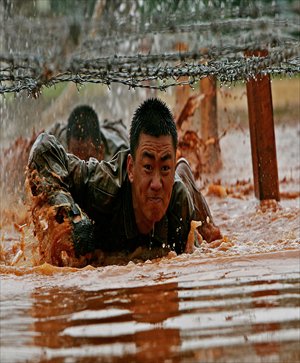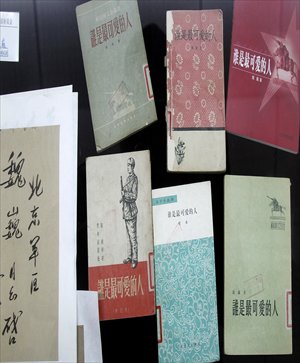Army of authors


China's military writers continue to rise in popularity
From the early Red Army literature in the 1950s to popular television series like Soldiers Sortie and My Chief and My Regiment in recent years, literature and TV dramas based on army culture have been an important part of China's literary scene.
Audiences are attracted by the characters and stories of soldiers during times of peace, but some may not realize that many of the books and scripts are penned by actual soldiers.
Military writers were initially recruited to write stories and record events about the Communist Party of China and the People's Liberation Army (PLA). Later, this position developed into an occupation in the army.
With China's 85th Army Day coming up on August 1, the spotlight will shine again on the people committed to defending China.
Symbolic soldier
In general, there are two kinds of writers in the army. Some specialize in writing about historical events such as wars and social movements in China. Others write about interesting people and lighter stories in the army.
Wang Shuzeng is a writer who has built his reputation writing about historical events such as the Long March, Korean War (1950-53) and Chinese People's War of Liberation.
In an interview with PLA Daily, Wang said that as a writer in the army, he felt it was his responsibility to write about the Party and the history of the army as a participating member.
Most young and female military writers focus on lighter stories. Although female writers in the military amount to a fraction of the number compared to their male counterparts, they have contributed many influential novels and scripts in the past years.
Themes from female writers usually focus on more personal subjects like marriage and the unique experience of women in the army.
Wang Hailing's novel Qianshou (holding hands) has been adapted to a television drama and received popularity in the late 1990s. Wang is also a screenwriter, and her script for the television series Chinese Style Divorce gained attention for its exploration of love and divorce in 2004.
"Being a soldier is one of the most traditional occupations," said Qiao Liang, a leading military writer in Chinese contemporary literature history and author of Unrestricted Warfare, an acclaimed book on military strategy.
Qiao told the Global Times that people like stories about soldiers, as soldiers are symbolic figures. Their heroic acts are often visually and emotionally shocking for the public.
As Qiao observes, the archetype of a soldier is one that rejects human emotions, a strong, masculine and brave figure.
But the atrocities they witness are often very emotional. Such clashes of human emotions create dramatic stories.
Outside view
"I don't think my work can be classified in the military genre," said Lan Xiaolong, the scriptwriter of The Line, Soldiers Sortie and My Chief and My Regiment. He said the military genre should target soldiers.
The characters in Lan's stories are not restricted by old-fashioned images of soldiers.
The novel Soldiers Sortie, for example, adapted to a TV series in 2007, features an innocent and clumsy village boy who joins the army, later becoming a qualified soldier.
"Many people think the military genre simply involves wearing a uniform or carrying a gun, but it is much more than that," said Lan.
Lan said an outsider is not equipped to write about the military, as they do not have access into the culture and the living rules of the environment.
Qiao said that for writers in the army, the understanding of military culture and the rules of the profession come from personal experience.
Military writers are usually either from a soldier family or people who joined at an early age.
After years of training and other tests of discipline, their understanding of military life is more nuanced.
Commercialization
It has been almost 50 years since the first group of army writers rose to popularity. At first, their stories centered on battles and war heroes, such as Wei Wei's article saluting soldiers in the battlefield in the Korean War.
Du Pengcheng, one of the earliest army writers, wrote the first long piece on the Chinese civil war between CPC and Kuomintang in Baowei Yan'an (Defend Yan'an) in 1954.
After the Cultural Revolution (1966-76), the older generation of writers focused on historical issues, while the younger generation told lighter stories.
In the 1990s, commercial interests overweighed politics in military literature, and the genre was not as popular as before.
The trend turned in 1996, when television programs like Peaceful of Years drew crowds.
For Lan, the genre is weaker now. "It is more like a combination of attractive commercial elements."
Qiao said army related works are overly commercialized. He uses Drawing Sword as an example of a novel with historical meaning but considers the TV series a commercialized adaptation.
Changes in the genre partly reflect changes in army life and the development of China's economics and culture. As for literature, Lan said most writers of his generation are influenced by Russian literature.
But since more people prefer watching TV over reading, an increasing amount of writers in the army have started drafting scripts.
For Qiao, few military works contribute to the development of China's literature, because most lack an innovative narrative.